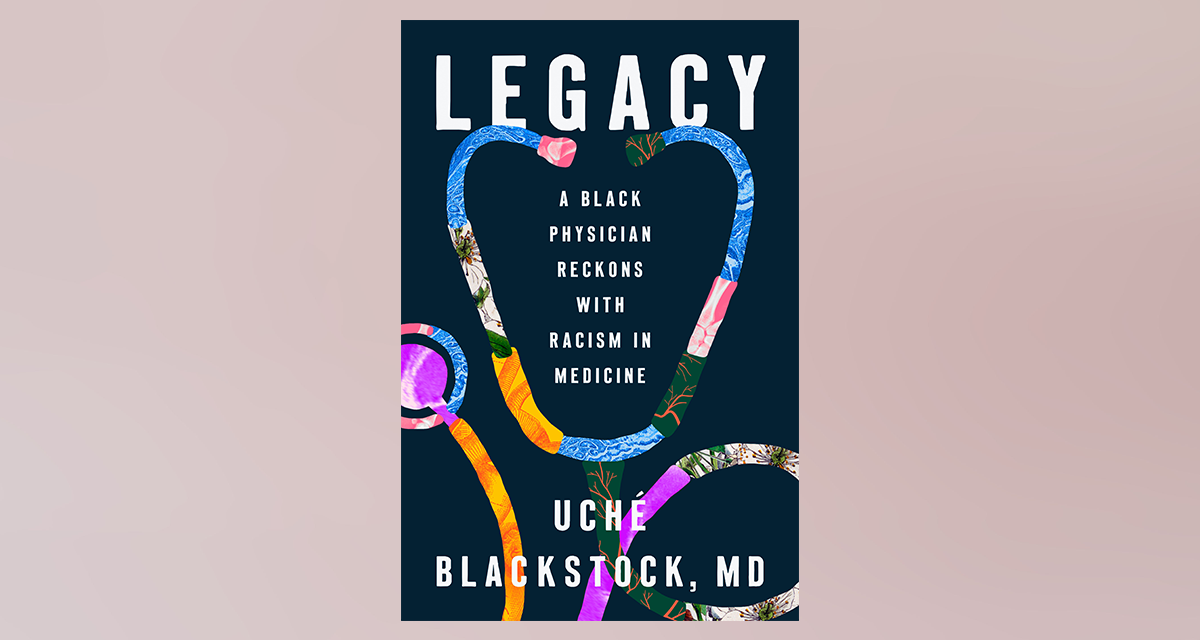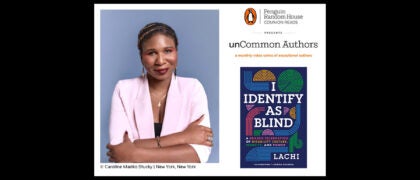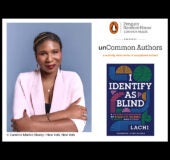At once a searing indictment of our healthcare system, a generational family memoir, and a call to action, Legacy is Dr. Uché Blackstock’s odyssey from child to medical student to practicing physician—to finally seizing her own power as a health equity advocate against the backdrop of the pandemic and the Black Lives Matter movement.
Introduction
When I was a little girl, my twin sister, Oni, and I used to visit our mother at work. Her name was Dr. Dale Gloria Blackstock, and in the 1980s and ’90s she was an attending physician at Kings County Hospital Center, one of the public hospitals affiliated with SUNY Downstate Health Sciences University, in Brooklyn, not far from our home in Crown Heights. Our mother worked long hours at her job and so sometimes we’d head to the hospital after school to see her and do our homework. Walking down the disinfectant-scented hallways, our shoes squeaking on the linoleum floors, we’d make our way to the large, echoing cafeteria, where we’d pull out textbooks from our backpacks and settle down to work alongside the physicians, nurses, technicians, and aides taking a break. The staff behind the counter knew us well, especially because we strongly resembled our mother, and would smile warmly and ask, “Visiting your mother today?”
After homework was done, we’d sneak into her clinic to ask for small change to spend on our favorite red Jell‑O. She’d hand it to us and, if we were quiet, let us stay and observe for a minute or two as she examined a patient. Our mother was warm, but serious with those in her care. Occasionally, her face would reveal a smile, but more often than not, she was extremely focused on what they were saying and what was going on in their lives. She’d grown up in the same Brooklyn neighborhood where the hospital was located. The daughter of a single mother from New Jersey, raised on public assistance, she’d become the first person in her family to graduate college, and after graduating from Harvard Medical School in 1976, she’d returned home to her community. At Kings County/ SUNY Downstate, she wasn’t just taking care of patients; she was tending to her neighbors. In her interactions with them, she always seemed to know as much about their children and families as she did about their respective medical problems. When you came in for a visit with Dr. Blackstock, you weren’t only having your blood pressure or cholesterol checked, you were also meeting with someone who was going to assess how your whole being was faring. I believe our mother practiced what is now known as structurally competent and culturally responsive care, which means that the entire complex nature of the patient’s background and the social context in which they live, work, love, and pray is considered during evaluation. And her patients loved her for it. She was always bringing home little gifts from them—a knitted shawl, homemade cookies or cake, tokens of appreciation.
My sister and I were only nineteen years old in 1997 when we lost our mother to leukemia—and she was just forty-seven. She died too young, but by then her influence had indelibly rubbed off on us. Our mother’s passion for learning, her dogged perseverance, and her commitment to serving her community heavily influenced our own decisions to become physicians. Oni and I both graduated from Harvard University and then attended Harvard Medical School, the school’s first Black mother-daughter legacy graduates. Like her, we both went to work with historically underserved populations after graduating, my sister at a hospital in the Bronx, while I went to train at Kings County/ SUNY Downstate in Brooklyn, following in our mother’s footsteps. In the years since then, I have felt her by my side in so many of my own interactions with patients: her ability to listen to and truly care continues to be a model for me. And it’s something that our patients are crying out for, now more than ever.
During the height of the COVID‑19 pandemic, in spring 2020, I found myself working at an urgent care center in Brooklyn, seeing in the region of eighty to ninety COVID patients per twelve-hour shift. One day, I remember walking into one of what seemed like an endless number of patient exam rooms to find a young Black woman in her early twenties waiting for me. She was hunched over and staring at her restless fingers, but when I said hello, she glanced up at me and gave me a quick once-over. The electronic chart said that she was visiting for shortness of breath after being diagnosed with COVID‑19 a few weeks earlier. Although she was wearing a mask, I could tell from the look in her eyes that she was scared.
In those pre-vaccine days, I spent the twelve hours of each shift covered head‑to‑toe in layers of personal protective equipment (PPE): gloves on my hands, my bulging surgical cap barely containing my locs, a surgical mask over the N95 covering my nose and mouth, and a clear plastic shield that would often fog up over my eyes. Not only did the heavy PPE make it difficult to move and breathe in the small airless clinic rooms, there was no way for me to express my encouragement to a patient, offer a smile of reassurance or a look of sympathy.
That day, I introduced myself and then asked the young woman to tell me about why she had come in. But before I got the chance to continue, she stopped me.
“Can I ask you something?”
I told her yes, of course, nodding vigorously in case my voice was muffled through the double mask and shield.
“Are you Black?”
I realized she couldn’t see my skin color under all the layers of PPE.
“Yes, I’m Black,” I replied, hoping she could see the smile in my eyes.
I could sense the tension leaving her body.
“Thank you, doctor,” she sighed. “At least I know you’ll listen to me.”
“I promise.”
In that moment, I knew that I was the physician she needed—someone who looked like her and whom she could instinctively trust.
The reality is that patients like the young Black woman in my clinic have much reason to be suspicious of a medical profession that continues to minimize their concerns and, intentionally or not, cause harm. One of the promises in the Hippocratic oath is “do no harm”; however, we know from multiple studies that clinicians have repeatedly caused harm to Black patients by dismissing their concerns and undertreating their pain. The good news is that racial concordance in clinician-patient interactions—the kind that my young patient craved and that my mother experienced with her patients—has been shown to actively improve health outcomes, particularly among Black patients. Studies indicate that Black babies who are cared for by Black neonatologists and pediatricians in their first year of life are more likely to survive than those treated by white neonatologists and pediatricians. What’s more, Black physicians are more likely to specialize in primary care and practice in underserved communities where patients are most vulnerable and in need of expert care. Racially concordant care for Black people is a matter of life and death!
The bad news is that there aren’t enough of us. Although I was fortunate to grow up with a Black physician mother, it’s important to understand that our mother was a rarity, as are my sister and I. The number of Black physicians in this country remains stubbornly low, with only 5.4 percent of all US physicians identifying as Black, 2.6 percent as Black men, and 2.8 percent as Black women—although Black people make up 13 percent of the population. There is actually a smaller percentage of Black male physicians now than there was in 1940, when Black men made up 2.7 percent of Black physicians.
Training more Black physicians is only one of the many solutions needed to address the glaring and persistent health inequities that exist, but we need multiple fixes, and we need them now, because it’s not just one thing that is going to solve this. The fact is that since the days, thirty years ago, when my mother was practicing medicine in Brooklyn, health outcomes have gotten worse, not better, for Black Americans. Despite the extraordinary advancements in health-care technology and innovation, structural racism continues to inflict heavy blows on the health of Black Americans.
US data collection on maternal mortality rates began in 1915. At that time, Black birthing people* were almost twice as likely to die from pregnancy-related complications as their white peers. Today, we are in the midst of an undeniable maternal mortality crisis in the United States, largely driven by the deaths of Black birthing people, who are three to four times more likely to die than their white peers. For decades in the US and around the world, maternal mortality rates had decreased due to improved living conditions, maternity services, surgical procedures, and access to antibiotics. However, around 2000, the US maternal mortality rate began to rise again.
Currently, Black men have the shortest life expectancy of any major demographic group. Black babies have the highest infant mortality rate. These horrifying trends were all true even before the pandemic was permitted to devastate our communities, brutally disabling and ending lives and exposing the deep racist fault lines in our society.
What’s perhaps most shocking about racial health inequities is that these outcomes often persist across socioeconomic status strata and levels of formal education. Think of Beyoncé or Serena Williams, both powerful, famous, and wealthy Black women who were at the pinnacle of their careers when they had their babies. Beyoncé is a world-class singer and performer. Serena is one of the greatest athletes of all time. Both women are healthy, are incredibly physically fit, and know their bodies well. Both women suffered near-fatal childbirth experiences. Serena reported that her medical team did not listen to her, endangering her survival and that of her child. Beyoncé experienced the same pregnancy complications as other Black women with considerably fewer resources. Even with my two Harvard degrees, I have a pregnancy-related mortality ratio five times that of a white woman who never finished high school. As the saying goes, if you’re not furious about this, you’re not paying attention.
Since the summer of 2020, there have been increasing general public demands to urgently reform racist policies in this country and a stronger desire and substantial need to start addressing systemic inequities at their root. There are finally discussions within medicine and health care about including education on systemic racism within medical school curricula and the other systemic factors that influence health, like poverty, inequality, inadequate housing, and lack of employment opportunities. There has been a call for health-care institutions to be more thoughtful and transformative in considering how we are educating and training anyone interacting with patients. The health-care system needs to give practitioners of all backgrounds a framework for understanding what Black patients and communities have gone through in this country for centuries and what they are still enduring. There is palpable urgency to move toward a model of structurally competent health care. The framework of structural competency, first described by Dr. Jonathan M. Metzl and Dr. Helena Hansen in 2014, offers a paradigm for training health professionals to recognize and respond to the impact of upstream structural factors, like poverty and systemic racism, on patient health and health care.
But we can’t fix the problem until we can see it clearly. It took me many years to fully understand the centuries of history underpinning racism in medicine today. There were many steps in my own education, glaring gaps in my learning and understanding as a young person and student. It took me until well into my career as physician to recognize the sheer scale of the problem, to free myself from the institutional status quo so that I could begin to fully speak my truth. It wasn’t until the time of COVID‑19 and the Black Lives Matter protests of 2020 that I finally came into my power and truth as a Black physician advocate on these issues. It was also at this time that I began to write this book.
In the chapters to follow, I will trace my mother’s journey and my own as a physician, identifying, as I go, the fault lines both within and outside our medical system. My hope is that our story will speak to anyone who is concerned about dismantling racism and centering equity and justice in this country, because it’s impossible to truly understand these phenomena until you understand the ways Black people have been excluded, ignored, and ill-served by our health-care system. We can and must do better for our Black patients and other patients of color, and by extension create communities that are fairer, more equitable, and healthier for everyone. Yet, progress has been far too slow.
Recently, I discovered an introductory letter my mother wrote, over three decades ago, for the event program of a 1990 convention of local Black physicians, in which she grapples with so many of the same problems we’re confronting today. “It is ironic that as we enter the age of neotechnology,” my mother wrote thirty years ago, “we do not have a health-care system in place that is equitable for all participants. Worse, a health-care system that refuses to embrace all in need.” Although she died prematurely, my mother’s spirit lives on in my sister and me, her patients, the communities she served, the future physicians she mentored, and the organizations she led. It will live on in this book too.
Copyright © 2024 by Uché Blackstock, MD. All rights reserved. No part of this excerpt may be reproduced or reprinted without permission in writing from the publisher.

© Diane Zhao
Dr. Uché Blackstock is a physician and thought leader on bias and racism in healthcare. She appears on air regularly as an MSNBC medical contributor and is the founder and CEO of Advancing Health Equity, as well as a former associate professor in the Department of Emergency Medicine and the former faculty director for recruitment, retention, and inclusion in the Office of Diversity Affairs at NYU School of Medicine. Dr. Blackstock received both her undergraduate and medical degrees from Harvard University, making her and her twin sister, Oni, the first Black mother-daughter legacies from Harvard Medical School. Dr. Blackstock currently lives in her hometown of Brooklyn, New York, with her two small children.





